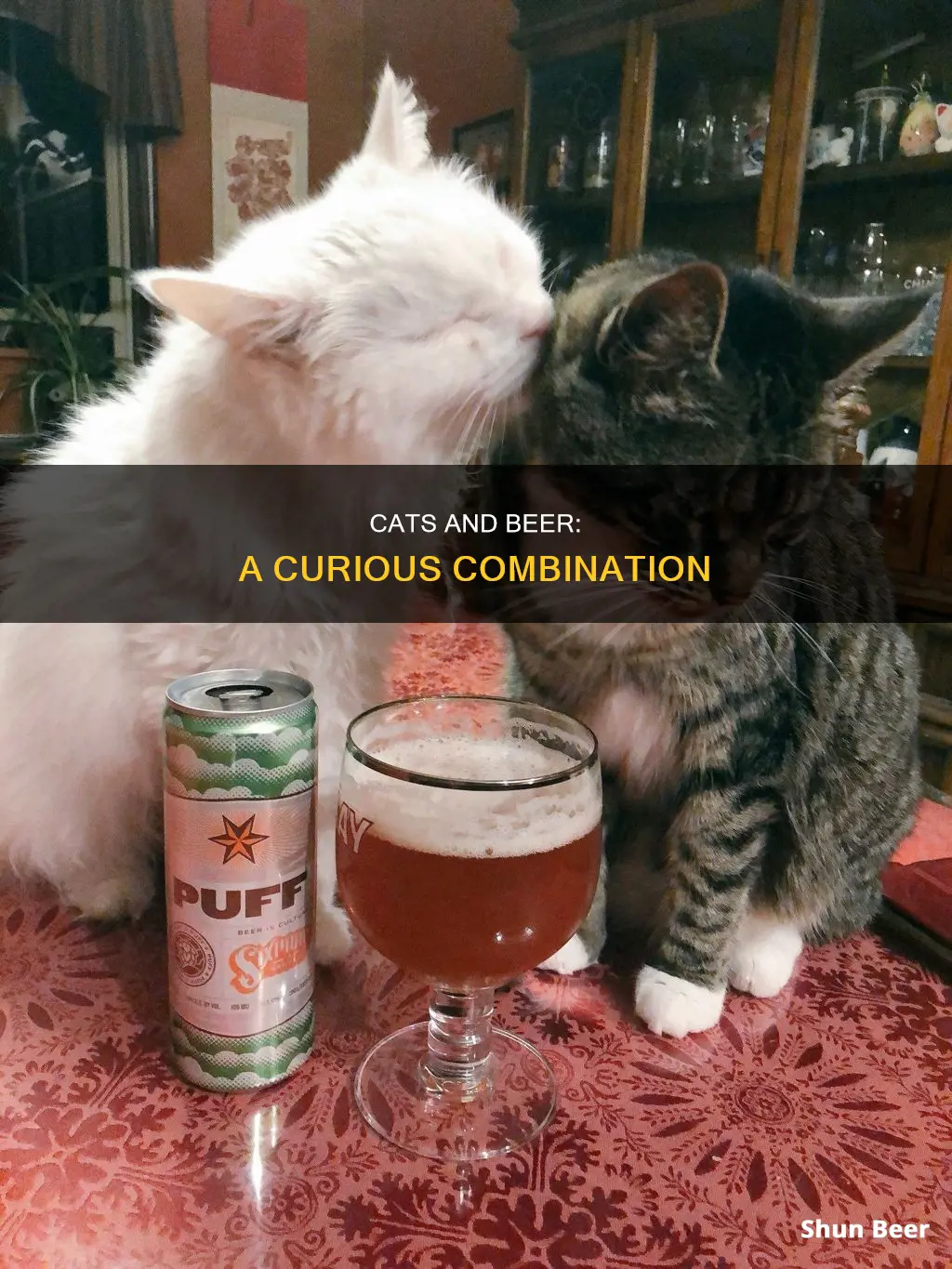
Cats and alcohol is a dangerous combination. While it is unusual for cats to be drawn to the smell of alcohol, they may still try to drink it, especially beer. If a cat ingests even a small amount of alcohol, it can be lethal. The smaller body size of cats means that their bodies are more vulnerable to the harmful effects of alcohol. If a cat consumes alcohol, they may experience symptoms such as wobbling, loss of coordination, tremors, nausea, vomiting, deliriousness, and increased thirst. In severe cases, cats may suffer from central nervous system issues or even fall into a coma. If you suspect that your cat has consumed alcohol, it is important to seek veterinary advice as soon as possible.
| Characteristics | Values |
|---|---|
| Should cats drink beer? | No |
| Is beer dangerous for cats? | Yes |
| Is beer toxic for cats? | Yes |
| Can beer be lethal for cats? | Yes |
| What are the symptoms of alcohol poisoning in cats? | Increased thirst, tremors, sluggish and shallow breathing, loss of awareness, wobbling, nausea, vomiting, deliriousness, central nervous system issues, coma |
| What to do if a cat drinks beer? | Call a veterinarian, monitor closely for symptoms, separate the cat from the alcohol |
What You'll Learn

Why do cats like beer?
Cats should not drink beer or any other type of alcohol. Alcohol is dangerous for cats and can even be lethal in small doses. Most types of alcohol contain ethanol and grain, which are toxic to cats. Cats can experience alcohol poisoning from ingesting just one teaspoon, with symptoms including increased thirst, muscle tremors, shallow breathing, vomiting, and a lack of awareness. In severe cases, cats may suffer from central nervous system issues or even enter a coma.
Despite the dangers, some cats seem to be drawn to beer. One theory is that cats are attracted to the smell of the raw ingredients in beer, such as hops, wheat, and barley, which they may crave to aid in digestion. Another possibility is that cats are attracted to the CO2 bubbles in beer. However, it is important to keep alcohol out of the reach of cats and to call a veterinarian immediately if your cat does ingest any alcohol.
While some owners may give their cats a small lick of beer as a treat, this is not recommended due to the potential health risks. The American Society for the Prevention of Cruelty to Animals (ASPCA) advises that "under no circumstances should your pet be given any alcohol." If you notice your cat has sneaked a quick lick of beer, remove the drink from their vicinity and monitor them for any symptoms of alcohol poisoning.
To prevent accidental ingestion, it is important to secure all alcohol in a safe place that your cat cannot access. This includes not only alcoholic beverages but also products containing alcohol such as mouthwash, hand sanitizer, and cleaning supplies. If you suspect your cat has ingested alcohol, time is of the essence. Contact your veterinarian and an emergency poison control center for assistance.
Enjoying Beer on Naples Beach: What You Need to Know
You may want to see also

What to do if your cat drinks beer
Cats should not drink beer or any other alcoholic beverage. If you suspect your cat has consumed alcohol, time is of the essence. Separate your cat from the alcohol and ensure that no other alcohol-containing products are within their reach.
Try to identify what your cat has consumed, how much they may have ingested, and when. If the product has a label, keep it so you can refer to the ingredient list. Check your cat for any unusual behaviour or changes, such as stumbling, nausea, vomiting, deliriousness, increased thirst, tremors, sluggish and shallow breathing, or a lack of awareness.
Contact your local veterinary clinic as soon as possible and relay this information to them. Follow their instructions, which will likely involve a visit and a check-over from a veterinarian. They may administer intravenous fluids to help your cat recover.
To prevent your cat from drinking beer, always secure alcohol in a safe place that your cat cannot access.
Antibiotics and Beer: A Safe Mix?
You may want to see also

Symptoms of alcohol poisoning in cats
Cats and dogs are more vulnerable to the harmful effects of alcohol since their bodies are significantly smaller than those of humans. Alcohol, even in small doses, can be lethal to cats. Beer typically contains between 3-5% alcohol, while wine contains between 9-12%. Other spirits such as whiskey or vodka can contain between 40-90% alcohol by volume.
Signs of alcohol poisoning in cats can set in between 30 and 60 minutes after initial contact, though this time can be delayed if the cat has a full stomach. The level of intoxication can vary depending on the size and age of the cat, as well as the amount of alcohol consumed.
- Vomiting
- Ataxia (a wobbly gait)
- Hyperactivity
- Decreased reflexes
- Depression
- Hypothermia
- Seizures
- Cardiac arrhythmia
- Death
If a cat displays any of these symptoms, it is important to seek immediate veterinary assistance. Treatment for alcohol poisoning often includes activated charcoal to absorb excess alcohol in the stomach and prevent further digestion. Supportive care, including IV fluids and hospitalization, may also be necessary.
It is crucial to keep alcoholic beverages, as well as other household products containing alcohol, out of reach of cats to prevent accidental ingestion and potential alcohol poisoning.
Germans' Historic Preference for Beer Over Water
You may want to see also

How much beer can be lethal for cats?
Cats cannot safely drink alcohol, and even a small amount can be lethal. Alcohol is toxic to cats because it contains ethanol and grain. Cats are more vulnerable to the harmful effects of alcohol because their bodies are much smaller than humans'.
There is no safe amount of beer for cats, and even a lick or two could be harmful. A quick lick of a light beer will likely be okay, but anything more than that could be dangerous. Cats can experience alcohol poisoning from ingesting just one teaspoon of alcohol, and the effects can be severe.
The signs of alcohol poisoning in cats are similar to those in humans and include stumbling, nausea, vomiting, deliriousness, increased thirst, muscle tremors, slow and shallow breathing, and loss of awareness. In severe cases, cats may suffer from central nervous system issues or fall into a coma.
If you suspect your cat has consumed beer or is showing any signs of alcohol poisoning, immediately call your veterinarian or an animal poison control centre. Time is of the essence, and your cat's life may be at risk.
Beer and Vicodin: A Risky Mix?
You may want to see also

What to do if your cat is showing symptoms of alcohol poisoning
Cats and dogs are more vulnerable to the harmful effects of alcohol since their bodies are significantly smaller than those of humans. Alcohol, even in small doses, can be lethal to pets.
If you suspect your cat has consumed alcohol, time is of the essence. You should immediately call your veterinarian and the Pet Poison Helpline for assistance. Your veterinarian will likely administer IV fluids and any other necessary medications.
Symptoms of alcohol poisoning in cats include:
- Increased thirst
- Tremors in the muscles
- Slow and shallow breathing
- Lack of awareness
- Lack of coordination
- Increased urination
- Low body temperature
- Abnormal heart rhythm
- Vomiting
- Ataxia (a wobbly gait)
- Hyperactivity
- Decreased reflexes
- Depression
- Seizures
- Cardiac arrhythmia
- Death
The prognosis for cats who have ingested ethanol is generally good. However, cases complicated by aspiration of gastric contents, the presence of other ingested material, or pre-existing diseases have a more guarded prognosis.
To prevent your cat from consuming alcohol, keep all alcoholic beverages and products containing alcohol out of their reach. This includes bread dough, which contains ethanol while rising, as well as household cleaning products, mouthwash, and hand sanitizer.
Mowing and Drinking Beer: Is it Safe?
You may want to see also
Frequently asked questions
No, cats cannot safely drink beer or any other type of alcohol. Even a small amount of alcohol can be lethal to cats.
Cats may be attracted to the smell of the raw ingredients in beer, such as hops, wheat, barley, etc. Cats eat and crave these ingredients in their natural state to aid in digestion.
Symptoms of alcohol poisoning in cats include stumbling, nausea, vomiting, deliriousness, increased thirst, tremors, sluggish and shallow breathing, and loss of awareness.
If you suspect your cat has consumed beer or any other type of alcohol, separate them from the alcohol and ensure that no other alcohol-containing products are accessible. Contact your veterinarian or an emergency animal hospital immediately and follow their advice.







